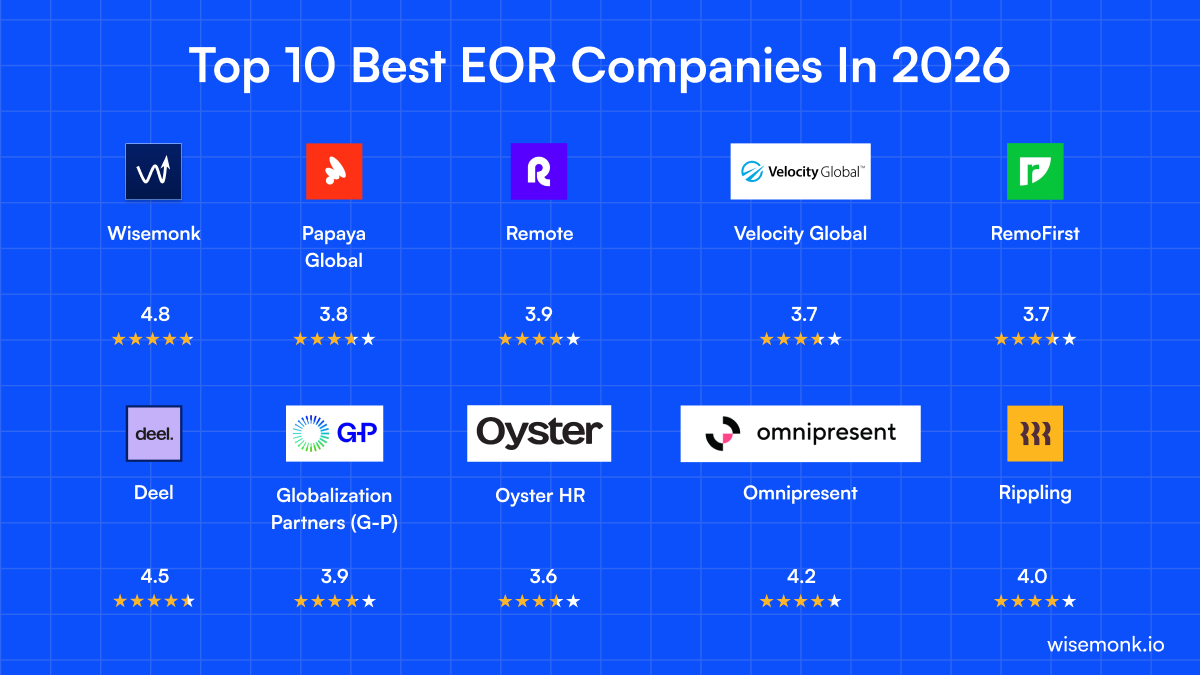Looking to streamline your business expansion into Cambodia with an Employer of Record EOR Cambodia solution? You’re in the right place. Expanding in ASEAN’s most dynamic low-cost manufacturing hub doesn’t have to mean navigating complex Labor Law Cambodia rules, work permit, Cambodia logistics, or NSSF Cambodia nuances on your own. As Cambodia’s textile, tourism, and services sectors boom, and government initiatives open new doors for foreign investors, an EOR in Cambodia offers a clear path to start operations fast, stay compliant, and maximize cost-effectiveness.
Let's explore everything you need to know about launching, hiring, and managing your workforce in Cambodia through a top-tier employer of record service.
What should employers know about Cambodia employment law?[toc=Employment Law Framework]
Getting employment right in Cambodia means knowing the rules. Based on our extensive research and hands-on experience, here’s what every Employer of Record EOR Cambodia needs to keep in mind:
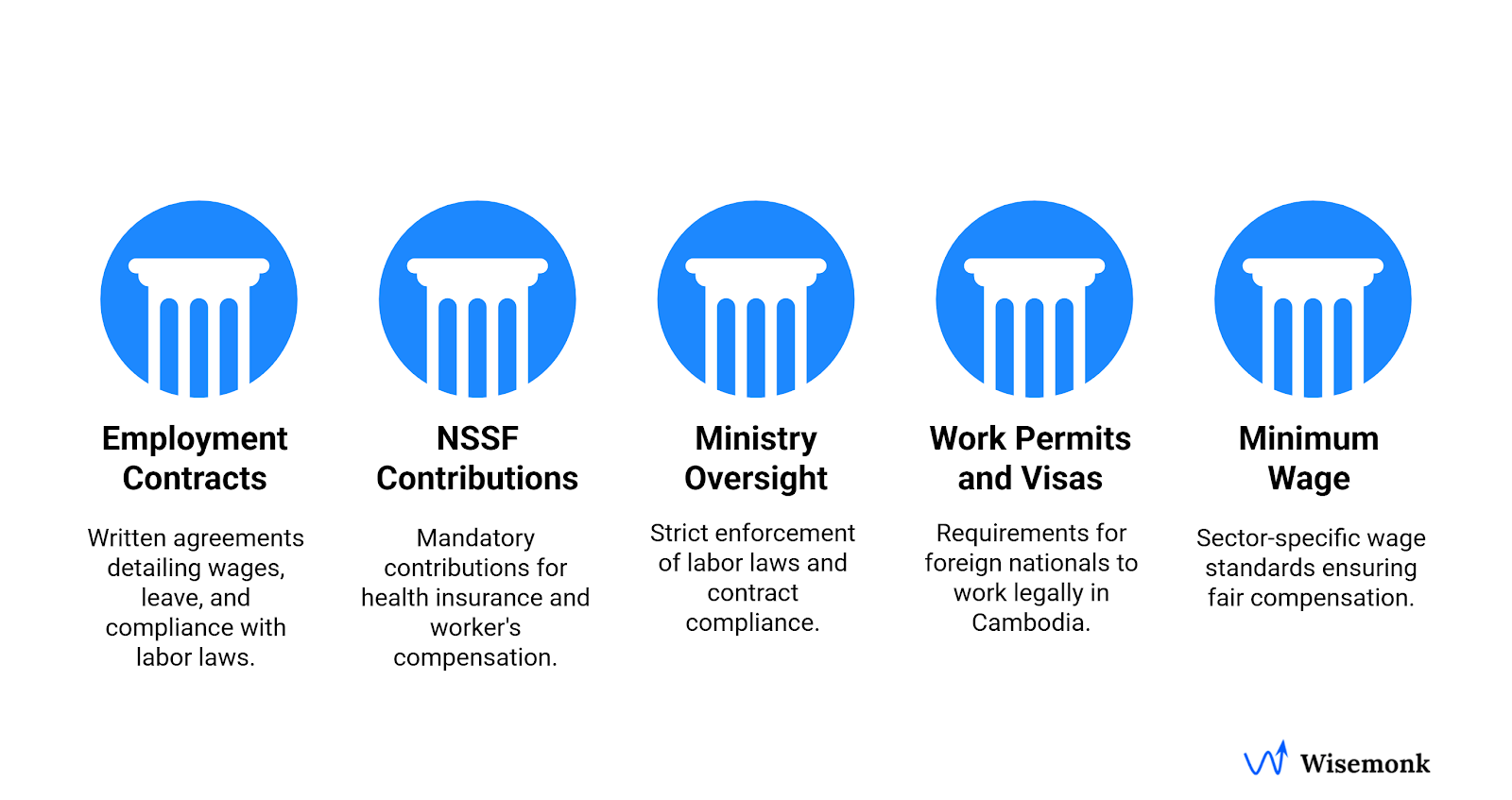
- Employment contracts: Written contracts are a must. Include minimum wage, probationary period, severance pay, sick leave, paid maternity leave, and annual leave. Compliance with Cambodian labor law and union guidelines is non-negotiable.
- NSSF contributions: Employers must register all employees, locals and foreign nationals, for the National Social Security Fund of Cambodia. Contribute 2.6% of each employee’s salary for health insurance and worker's compensation.
- Ministry of Labor oversight: The Ministry of Labor and Vocational Training strictly checks contracts, employment cards, wage payments, and enforces all local labor laws.
- Work permits and visas: All foreign nationals need an E-class visa and an annual work permit from Cambodian issues. EOR services handle onboarding, work permit applications, and legal compliance.
- Minimum wage: Minimum wage in Cambodia varies by sector. Garment/textile sector rates are typically over $200/month. Always check your sector’s rates for compliance.
Keeping up with these requirements minimizes risk, ensures smooth hiring, and builds a strong foundation for your business operations in Cambodia.
What are the Key Benefits of Cambodia EOR Services?[toc=Key Benefits]
Curious about how an employer of record EOR Cambodia boosts your business? In our experience, having guided global firms in hiring, the benefits are clear and tangible.
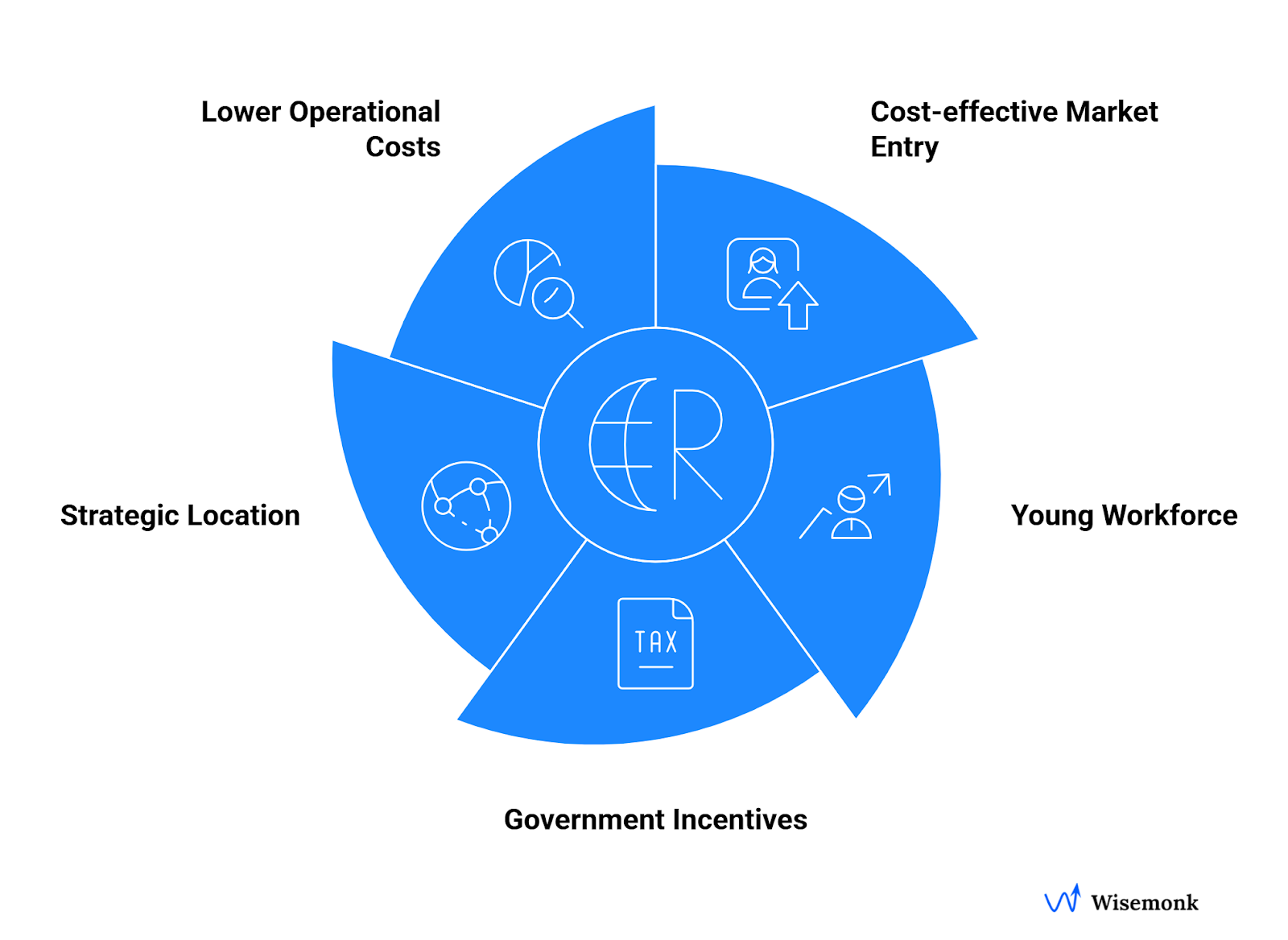
- Cost-effective ASEAN market entry: EOR services let you hire employees in Cambodia without setting up a local entity, instantly lowering your Cambodia EOR cost and cutting admin overhead.
- Access to a young, trainable workforce: Over 60% of Cambodia’s population is under 35, creating a vast pool of motivated, adaptable Cambodian employees, perfect for scaling operations or hiring local talent.
- Government incentives for manufacturing: Cambodia offers tax breaks, duty exemptions, and training incentives for manufacturers, making your expansion even more cost-effective.
- Strategic regional location: Cambodia’s central position in ASEAN, strong connectivity, and special economic zones help you streamline business operations and reach regional markets.
- Lower operational costs than neighbors: Compared to other ASEAN nations, Cambodia’s minimum wage, labor contracts, and local entity operation costs remain highly competitive, helping maximize your profits and minimize spending.
Based on our research, choosing an EOR in Cambodia provides a seamless management solution for market entry, legal compliance, and rapid business expansion.
How do Cambodia EOR services work?[toc=How EOR Service Works]
An Employer of Record EOR Cambodia, manages every hiring step with a lean, fully compliant process. From our experience as a leading EOR service provider, supporting global clients, the process is lean and fully compliant.
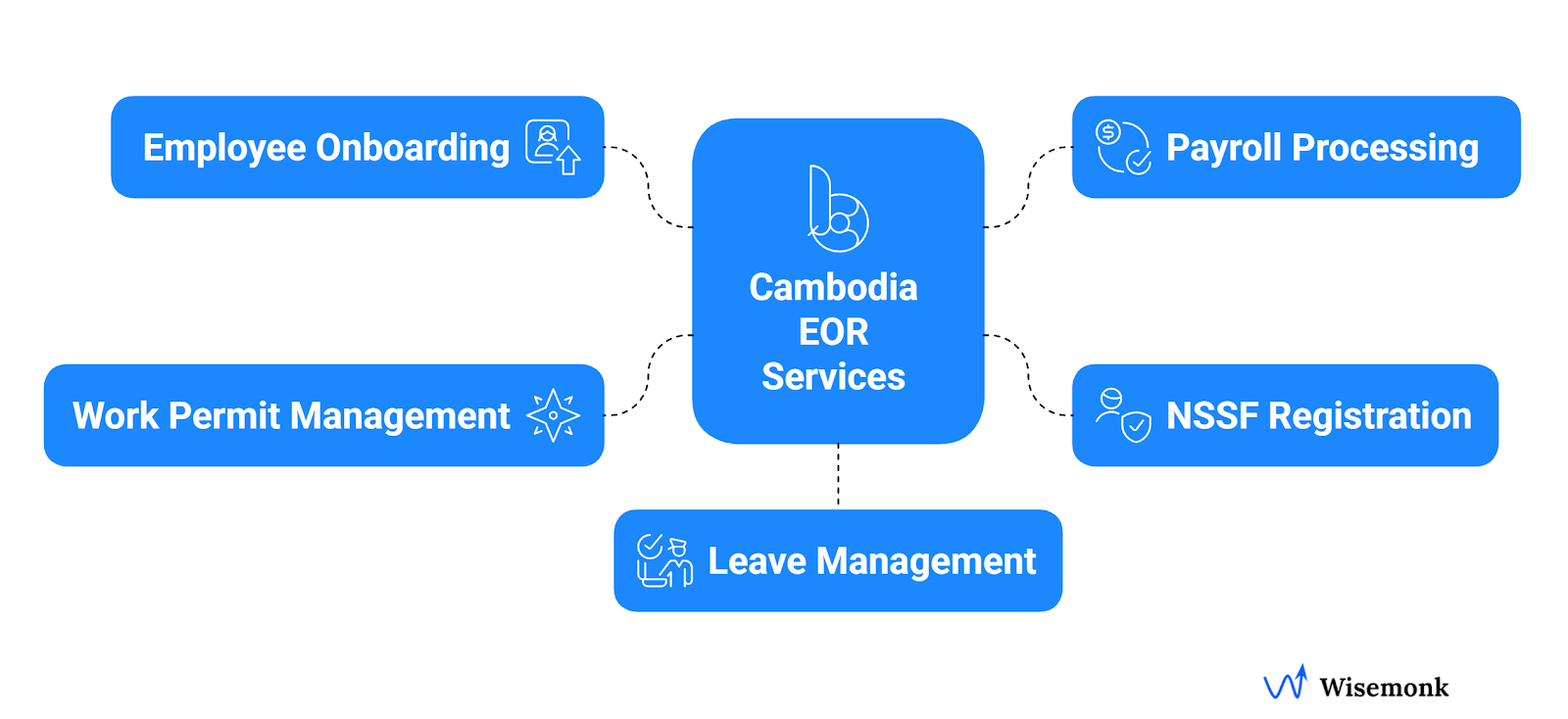
- Employee onboarding and contract creation: The EOR drafts and signs employment contracts in line with Cambodian labor law, ensuring all legal and local requirements are met, fast onboarding, clear employment agreements, and smooth new employee integration.
- Monthly payroll processing: EOR services process payroll in Cambodian Riel (KHR) or USD, calculate tax and social security deductions, and ensure timely, compliant employee payments.
- NSSF Cambodia registration: Every hire is enrolled with the National Social Security Fund, and contributions are submitted monthly for locals and foreign nationals, covering mandatory health insurance and workers compensation.
- Work permit applications and renewals: The EOR manages work permit Cambodia applications, annual renewals, and e-class visa procedures for foreign nationals, keeping your team legal and worry-free.
- Leave management and benefits: All leave entitlements, annual leave, sick leave, maternity leave, paid public holidays, and additional benefits are tracked and administered by the EOR for full compliance with Cambodian labor law.
Letting a Cambodia Employer of Record oversee these HR, payroll, and legal tasks frees you to focus on business expansion, not paperwork.
What are Cambodia-specific EOR compliance requirements?[toc=Compliance Requirements]
Getting the details right is key for employer of record EOR Cambodia services. Based on our research and experience, these requirements make seamless management and legal compliance possible.
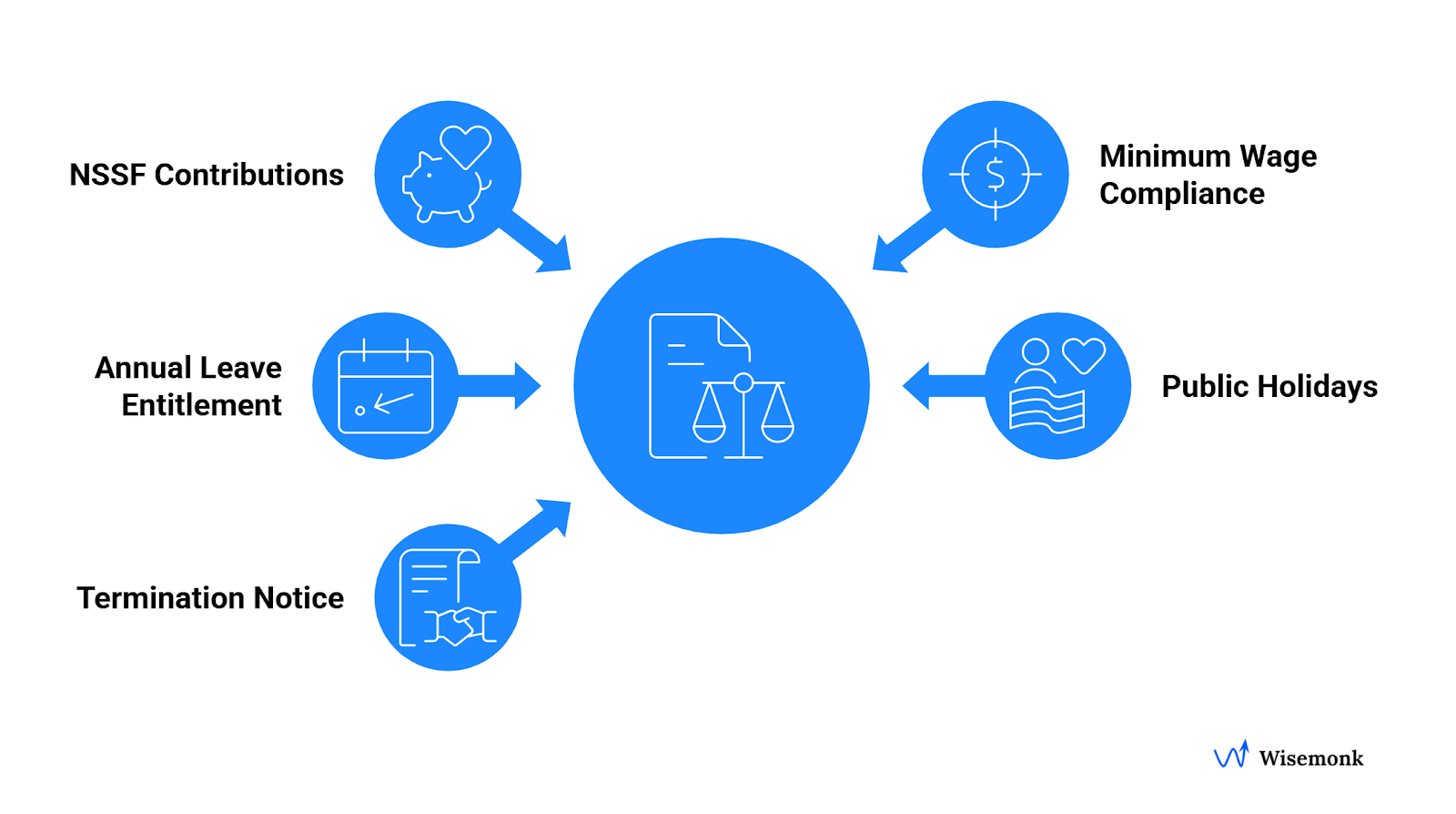
- NSSF contributions: Register every employee (including foreign nationals) and pay 2.6% of their salary to the National Social Security Fund Cambodia for health insurance, pension, and worker compensation, as required by Cambodian labor law.
- Minimum wage compliance: Minimum wage in Cambodia in 2025 is $208/month for the textile and footwear sectors; rates differ for other industries and regions. Always check official regulations and sector benchmarks.
- Annual leave entitlement: Employees receive 18 days of paid annual leave after one year of service (1.5 days/month). This increases with seniority, per Cambodian law.
- Public holidays and religious observances: Cambodia observes multiple paid public holidays and religious dates, such as the Khmer New Year and Pchum Ben. Employers must accommodate and pay employees accordingly.
- Termination notice and severance pay: Termination requires prior notice, 7 days up to 6 months' service, up to 3 months for longer tenures. Severance pay calculations depend on contract type, with 5% of total salary for fixed-term contracts and up to 15 days of wages per year for open-ended contracts.
Following these Cambodia Employer of Record requirements ensures compliance with local laws, supports worker rights, and reduces legal risks, crucial for any business expanding in Cambodia.
How to choose the right Cambodia EOR provider?[toc=How to Choose the Right EOR]
Selecting an employer of record EOR Cambodia partner is crucial for compliance and smooth operations, the best providers stand out for these reasons:
- Labor law expertise and local knowledge: Choose a Cambodian employer with proven knowledge of Cambodian labor law, employment contracts, and ongoing updates from the Ministry of Labor and Vocational Training. Local expertise ensures error-free employment agreements and fully compliant onboarding.
- NSSF administration experience: Effective EOR services should expertly handle National Social Security Fund Cambodia registration, reporting, and ongoing mandatory contributions for all employees, locals and foreign nationals.
- Work permit and immigration support: Look for providers with a successful track record in handling work permit Cambodia applications, e-class visas, and immigration for foreign nationals. This avoids delays and lowers legal risks.
- Manufacturing and textile sector know-how: In our work with global clients, manufacturers benefit most from EORs with sector experience, especially hiring specialized workers, managing minimum wage changes, and understanding trade unions in the textile and garment industries.
- Cultural understanding and Khmer language support: An ideal provider offers Khmer language support, smooth communication with the labor inspector and local employees, and helps you navigate cultural norms around paid public holidays, sick leave, and workplace expectations.
A professional employer organisation with these strengths streamlines your hiring process, minimizes compliance headaches, and enhances your business expansion in Cambodia.
How does Cambodia EOR vs Company Setup stack up?[toc=EOR Vs Company Setup]
Choosing between an employer of record EOR Cambodia and a full company setup hinges on cost, speed, and compliance. Here’s what our experience and research show:
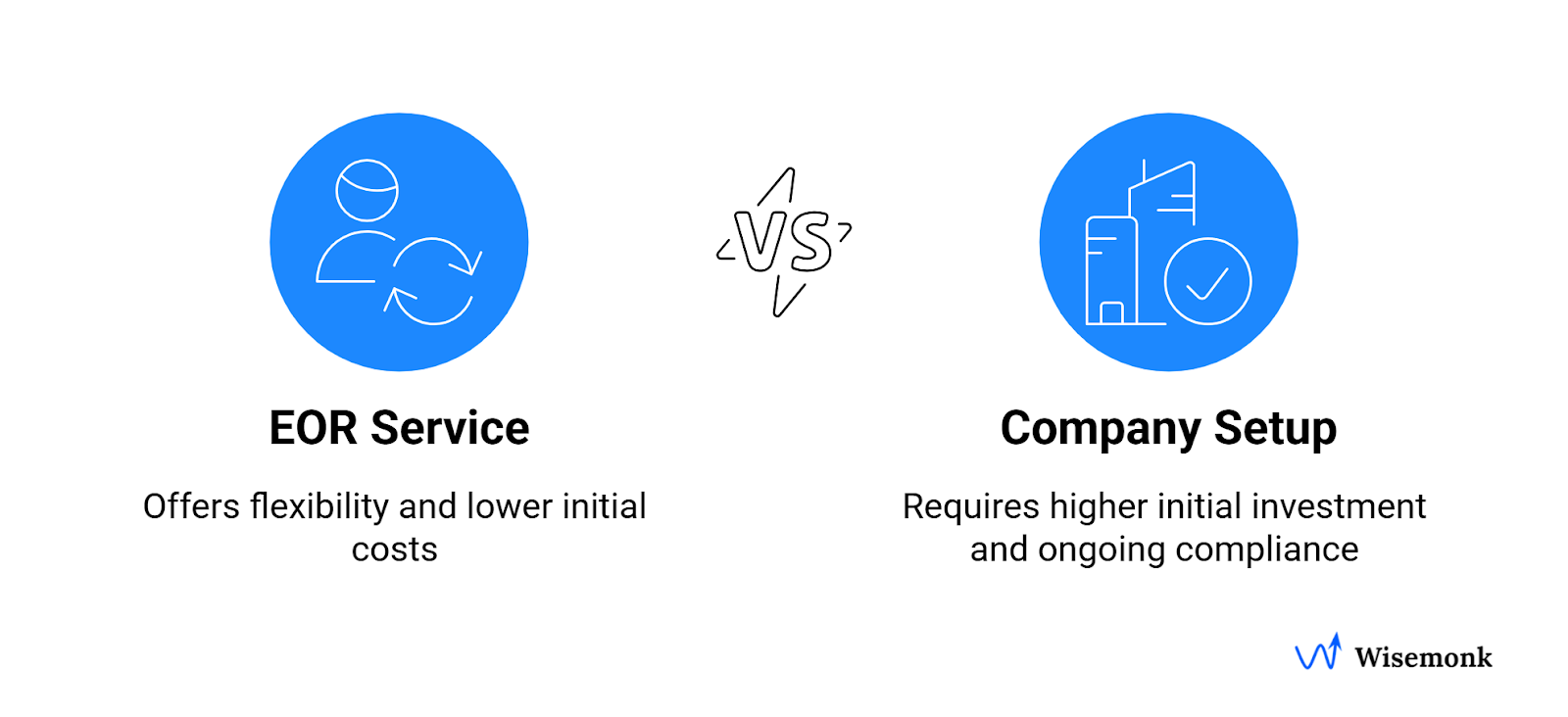
- EOR service costs: Cambodia EOR typically runs $200–$400 per employee per month, with some providers listing from $199 to $700/month, great for flexible, low-risk hiring without a local entity.
- Company registration expenses: Registering a local entity costs $800–$3,000 in government fees, plus legal, documentation, and sector licensing costs. Complex setups, like manufacturing, can push this higher with added paperwork and compliance checks.
- NSSF and regulatory compliance: Both models require National Social Security Fund Cambodia registration (2.6% of wages) and ongoing local law compliance, including tax, payroll, and paid leave management.
- Professional admin and ongoing expenses: Owning a legal entity requires regular accounting, payroll, statutory tax filings, employment contract drafting, and HR admin expertise, which adds ongoing expense and effort.
- Manufacturing license and sector-specific needs: Manufacturing or specialized business requires several additional licenses, government approvals, and sector-specific authorizations.
Cambodia EOR is a cost-effective solution for fast entry and seamless management, while company setup is best for high headcount, a long-term local entity, or market-specific regulatory requirements.
What are the latest Cambodia EOR market trends in 2025?[toc=2025 Market Trends]
Cambodia’s employer of record EOR market is evolving fast, fueled by growth in textiles, surging tourism recovery, digital transformation, and better regional connectivity. Here’s what sets Cambodia apart:
- Textile and garment industry evolution: Cambodia’s garment sector is booming, 116 new garment factories opened in H1 2025, pushing total factories to over 1,680. Garment and footwear exports hit $7.38billion in H1 2025, up 22% YoY, with nearly one million Cambodians now employed in GFT (garment, footwear, travel goods) manufacturing. Government-led vocational training and labor law incentives keep the workforce competitive and adaptable.
- Tourism sector recovery post-pandemic: In 2024, Cambodia welcomed 6.7million international visitors, a 23% jump from 2023. Siem Reap and Phnom Penh hiring surged as tourism bounced back, with new digital ticketing and infrastructure supporting this comeback.
- Digital transformation and e-commerce growth: Cambodia’s e-commerce market is expected to hit $1.78billion in 2025, a 17.9% growth rate, now contributing nearly 7% of GDP. Social commerce dominates via Facebook and TikTok, driven by a tech-savvy, mobile youth workforce.
- Infrastructure development and connectivity: Mega-projects like the Funan Techo Canal, Techo International Airport, and 174 government-backed transport projects are reshaping business operations and pushing Cambodia towards upper-middle-income status.
- ASEAN economic integration benefits: Membership in the ASEAN Economic Community gives Cambodian employers broader access to trade, manufacturing incentives, skilled labor, and regional partnerships, helping companies cut Cambodia EOR cost and open new markets rapidly.
These Cambodia EOR trends make the country a standout, low-cost, high-growth ASEAN hub, ready for global companies to take advantage of through seamless EOR services.
Conclusion[toc=Conclusion]
Choosing an employer of record EOR Cambodia gives you a fast, low-cost way to hire employees and comply with Cambodian labor law without setting up a local entity. From our experience, EOR services simplify payroll, onboarding, NSSF Cambodia registration, and work permit Cambodia processing, removing legal risks and admin burdens.
Strategic advantages:
- Quick market entry into Cambodia’s booming export, tourism, and e-commerce sectors.
- Full management of labor contracts, minimum wage, paid leave, and notice period compliance.
- Access to government incentives, solid infrastructure, and a young, skilled workforce.
Cambodia’s textile boom, digital growth, and tourism recovery create ideal conditions for Phnom Penh hiring and cost-effective business operations. EORs help tap specialized workers or hire local talent in days. Pick a Cambodia EOR with deep knowledge of Cambodian labor law, NSSF contributions, work permit Cambodia rules, and sector-specific expertise. This cuts cost, reduces legal risk, and ensures seamless management. An EOR is the safest, quickest, and most cost-effective way to expand in this thriving emerging market.
Ready to expand your global business quickly and compliantly? Partner with Wisemonk’s Employer of Record services to effortlessly manage hiring, payroll, and compliance, so you can focus on growing your business with confidence.
Frequently Asked Questions
What are the minimum wage requirements in different sectors in Cambodia?
As of 2025, the minimum wage Cambodia sets for the textile, garment, and footwear sectors is $208/month; other sectors set wages based on labor contracts, but the official minimum applies only to select industries.
How do NSSF contributions work for foreign employees through EOR?
Cambodia’s NSSF requires 2.6% of each employee’s salary, including foreign nationals, for health, accident, and pension coverage; EOR services ensure all employees are fully registered and compliant.
What work permit categories are available in Cambodia through EOR?
EORs support E-class visa categories: EB (employment/business), EP (job seekers), EG (general job search), ER (retirees), and ET (technician); temporary and permanent work permits are issued by the Ministry of Labor for foreign nationals.
How does Cambodia EOR support manufacturing operations?
An employer of record EOR Cambodia handles labor contracts, payroll, minimum wage compliance, onboarding, and work permits, allowing quick setup for manufacturing or textile operations without forming a legal entity.
What are the cultural considerations when hiring in Cambodia through EOR?
Effective EOR partners bring strong Khmer language support, understand workplace etiquette, prioritize respect and hierarchy, and navigate local labor law, helping foreign employers build trust with Cambodian employees.
Frequently asked questions
What are the minimum wage requirements in different sectors in Cambodia?
As of 2025, the minimum wage Cambodia sets for the textile, garment, and footwear sectors is $208/month; other sectors set wages based on labor contracts, but the official minimum applies only to select industries.
How do NSSF contributions work for foreign employees through EOR?
Cambodia’s NSSF requires 2.6% of each employee’s salary, including foreign nationals, for health, accident, and pension coverage; EOR services ensure all employees are fully registered and compliant.
What work permit categories are available in Cambodia through EOR?
EORs support E-class visa categories: EB (employment/business), EP (job seekers), EG (general job search), ER (retirees), and ET (technician); temporary and permanent work permits are issued by the Ministry of Labor for foreign nationals.
How does Cambodia EOR support manufacturing operations?
An employer of record EOR Cambodia handles labor contracts, payroll, minimum wage compliance, onboarding, and work permits, allowing quick setup for manufacturing or textile operations without forming a legal entity.
What are the cultural considerations when hiring in Cambodia through EOR?
Effective EOR partners bring strong Khmer language support, understand workplace etiquette, prioritize respect and hierarchy, and navigate local labor law, helping foreign employers build trust with Cambodian employees.
What is the employer of record in Cambodia?
An Employer of Record services/EOR services provider acts as a legal employer, facilitates salary payments, and manages other statutory requirements such as health insurance, payroll taxes, and employee benefits ensuring compliance with local tax laws and regulations.
What are the types of employment contracts in Cambodia?
Cambodian Labour Law primarily recognizes two main types of employment contracts: Fixed-Duration Contracts (FDCs) and Undetermined-Duration Contracts (UDCs).
.png)
.png)
%20(1).webp)
